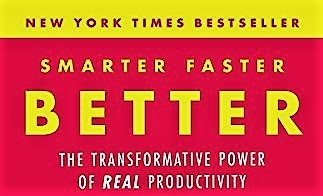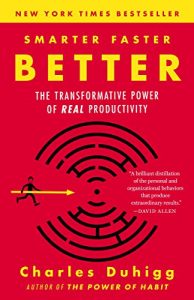
Smarter Faster Better by Charles Duhigg
I loved The Power of Habit by Charles Duhigg and have been looking forward to his next book, Smarter Faster Better: The Transformative Power of Real Productivity. I must admit being disappointed, but only slightly. I still recommend this book and it’s “productivity hacks”. Smarter Faster Better is well written, with great stories which bring quality science to life.
Summary of the book:
The book is a collection of eight ways to boost productivity:
- Motivation: Learn about autonomy and “locus of control” as key motivators. Self-determination theory backs up this focus on autonomy. The easiest way to get autonomy is to make choices. Duhigg encourages us to retain control through choices in order to boost motivation.
- Teams: For team success, focus on psychological safety. Both research and Google have identified this as a primary factor in team success. If you feel you can take risks and say whatever comes to mind without feeling insecure or embarrassed, you’ve got psychological safety. Your productivity will benefit as a result. The author uses fun stories of the Saturday Night Live cast bonding to bring these concepts to life.
- Focus & Mental Models: Avoid cognitive tunneling, where all you can see is one way of looking at reality. That excessively narrow focus can lead to problems. The author suggests that accurate mental models can help us do a better job of focusing in a helpful way. As I read this I thought of The Fifth Discipline, the classic business book by Peter Senge where I was first exposed to the importance of mental models. Smarter Faster Better also has us focus on what will probably happen, which obstacles we might run into, and how we might avoid or overcome these challenges.
- Goal Setting: Big, hairy, audacious goals (BHAGS) are key. Duhigg draws
 on research to suggest we craft those stretch goals (BHAGS), then break those into SMART sub-goals. While I personally prefer SMARTEST to SMART, and many of us already know about goal setting in detail, the approach Duhigg advocates is wise.
on research to suggest we craft those stretch goals (BHAGS), then break those into SMART sub-goals. While I personally prefer SMARTEST to SMART, and many of us already know about goal setting in detail, the approach Duhigg advocates is wise. - Managing Others: Again, autonomy motivates people. They also work better when they trust the people they work with, and feel appreciated. Again, to many this is well known, but Duhigg writes about it well, as he draws agile methodologies into the mix in a way that is interesting and fresh.
- Decision Making: To make the best decisions, we need to get a variety of differing perspectives. We should use those perspectives to forecast various future possibilities. We can then make decisions based on the likelihood of those possibilities. Poker stories help bring these concepts to life.
- Innovation: To reach breakthroughs, we need to be idea brokers. Combining disparate elements results in something new. If we are constantly challenging assumptions and looking for new ways of thinking, we will innovate.
- Absorbing Data: Work with data, don’t stare at it. We are swimming in data these days, but many of us don’t understand that data. In order to understand and act on that data, we need to really work with it. We benefit from writing down numbers or graphing them by hand. We need to hear, see, write, graph, test, and discuss data to really learn from it and use it.
My analysis and recommendation
This book is filled with great ideas, but they don’t connect to each other very well. Duhigg is an excellent writer and this book is filled with excellent stories and science. But I knew several of the ideas already, and the ideas don’t hold together in a way that’s memorable or useful.
The best way to use this book may be to pick a specific chapter you are interested in, and read just that chapter. Then repeat when you become interested in a new topic covered in the book.
I loved The Power of Habit because it told one cohesive, useful, science-backed story of how we can harness the power of habit to be more successful. Smarter, Faster, Better would have been more successful if it had tackled fewer ideas, and better connected those ideas into a cohesive framework.
Despite these imperfections, I recommend Smarter, Faster, Better to anyone interested in a well-written book that uses science to help us boost our productivity.
As always, I’d appreciate reading your comments and questions below or on social media.